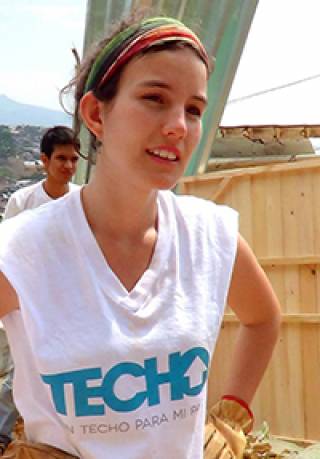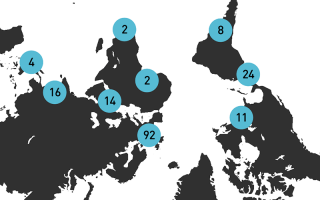Luisa recounts experiences of studying MSc Building & Urban Design in Developmentat the Development Planning Unit

I have always been interested in Latin America, a context I was born into but knew very little about when I began my bachelor degree in Geography, Politics and International Relations at Royal Holloway University. It was this particular curiosity that motivated me to search for an internship in Colombia, working for an NGO, alongside victims of internal displacement (IDPs). During this time, I met a lady who told me her life story, including her experience as a guerrilla recruit and as a victim of paramilitary groups. Little did I know, that years later I would be thinking of that encounter as the first step of my career as an urban practitioner.
This occasion in Colombia and others following exposed me to a series of urban complexities on a daily basis. I was inspired and amazed by the things I saw when I turned a corner or entered a home, particularly in an informal settlement, where I had thought there might be suffering or conflict, but instead found happiness and innovation. It was through these discoveries and a series of right turns, as well as the help of my undergraduate thesis supervisor, that I ended up applying to the BUDD program at the DPU.
Contrary to my expectations, BUDD was not just a series of lectures, seminars and essays. It came with plenty of baggage, a new family of people I learnt to love and hate at different times of the year, depending on how much I managed to sleep, eat and breathe. But more importantly, it came with a lesson that is very rare and valuable. It taught me to identify my strengths, nurture them and seek to use them in the best way possible.
Throughout this masters I worked with a diverse range of disciplines, scales, actors and media that highlighted to me the importance of the ‘bigger picture’; the importance of being able to deconstruct processes of development, through the evaluation and analysis of both their measurable and non-measurable impacts, and then piece them back together to implement in the built environment. It also taught me to consider and question the concept of power within these processes and understand them through different lenses projected across space, generated by the different activities and actors that make up the urban.
Initially it all sounded quite abstract to me but, bit by bit, I begun to understand the urban context and its production in a different way. This experience enabled me to generate a diverse set of skills, including thinking critically and reflectively. To a certain extent, I now look back and believe that is what I had been searching for when I applied to BUDD. I was feeling a need to question and reflect critically on the impact that I personally, and the organizations I volunteered at, were really having on marginalized urban communities. It is precisely the development of this self-awareness, with many questions and few answers that I most treasure about the masters.
Every reflection made throughout the year was challenged, questioned, de-constructed and re-constructed, a process that is often overlooked in the ‘real world’ yet incredibly valuable and necessary, particularly when it comes to the notion of ‘development’. Whilst one might know that this is necessary, it is only through experiences such as BUDD, where you are exposed to an incredibly diverse and brilliant group of people with many different views to challenge yours, that you can really take advantage of the critical and reflective engagement process.
I have since worked for TECHO where I began as sub-director of the housing program in Bogotá and was then offered the opportunity to assist the coordination of the housing and community infrastructure projects program. Through this experience, I became increasingly interested in the socio-political processes that accompany the planning and transformation of cities, particularly the role of community mobilisation and activism.
Since, I have continued to explore this interest through my work with the Active Learning Network for Accountability and Performance (ALNAP) researching the role of community engagement in urban humanitarian interventions; and through my more recent participation in the Junior Professionals Program coordinated by the DPU and the Asian Coalition for Housing Rights (ACHR). I am based in Manila, working with the Technical Assistance Movement for People and Environment (TAMPEI). For six month I will be researching the potential of citywide community mapping strategies, in the Philippines, for building community capacities to open spaces of negotiation with local governments.
My “career” or as I’d prefer to refer to it, this adventure, has only just begun and it already presents itself with new challenges every day. The most influential challenge for me at the moment is the continuous reflexive process, that I find myself in, of questioning my positionality and role within a world of ‘urban practitioners’. How, coming from such an interdisciplinary background and seemingly continuing on that path, can I contribute? This is something that BUDD made possible, as it enabled me to unlock many doors that I am now opening to explore further.
 Close
Close


